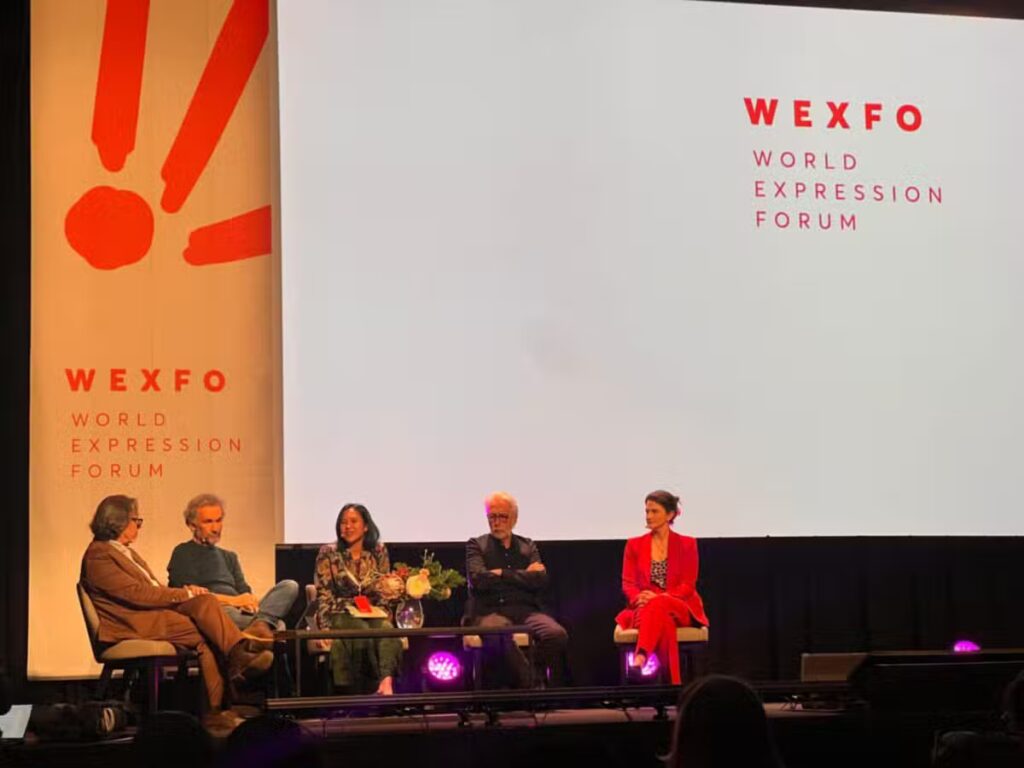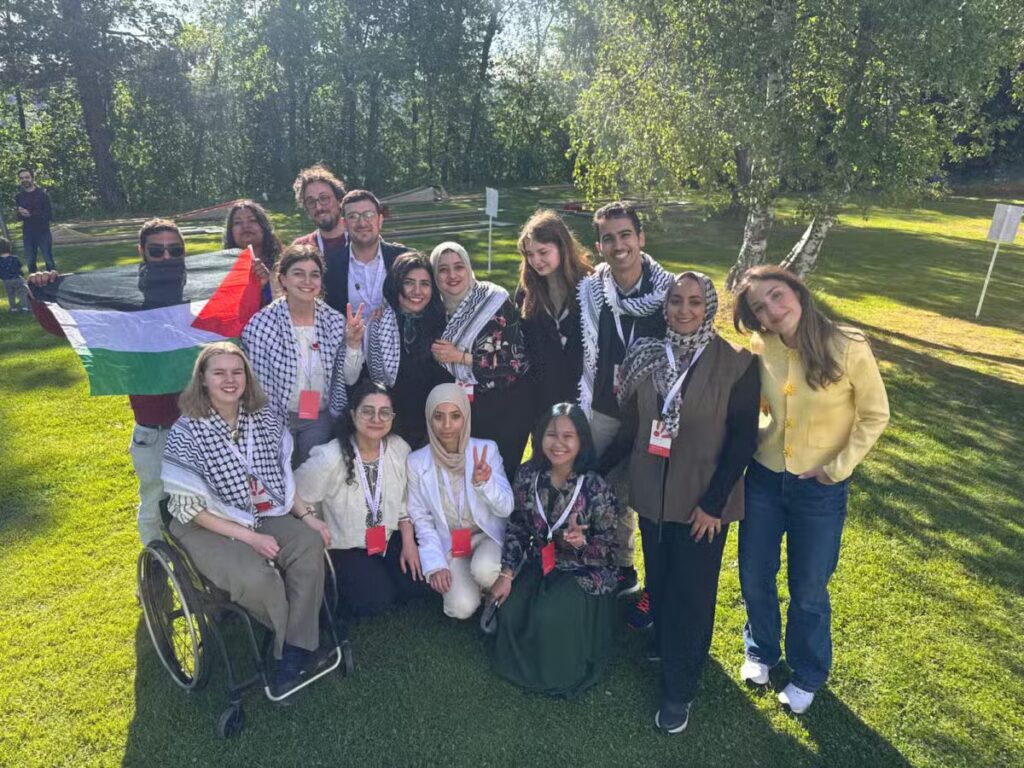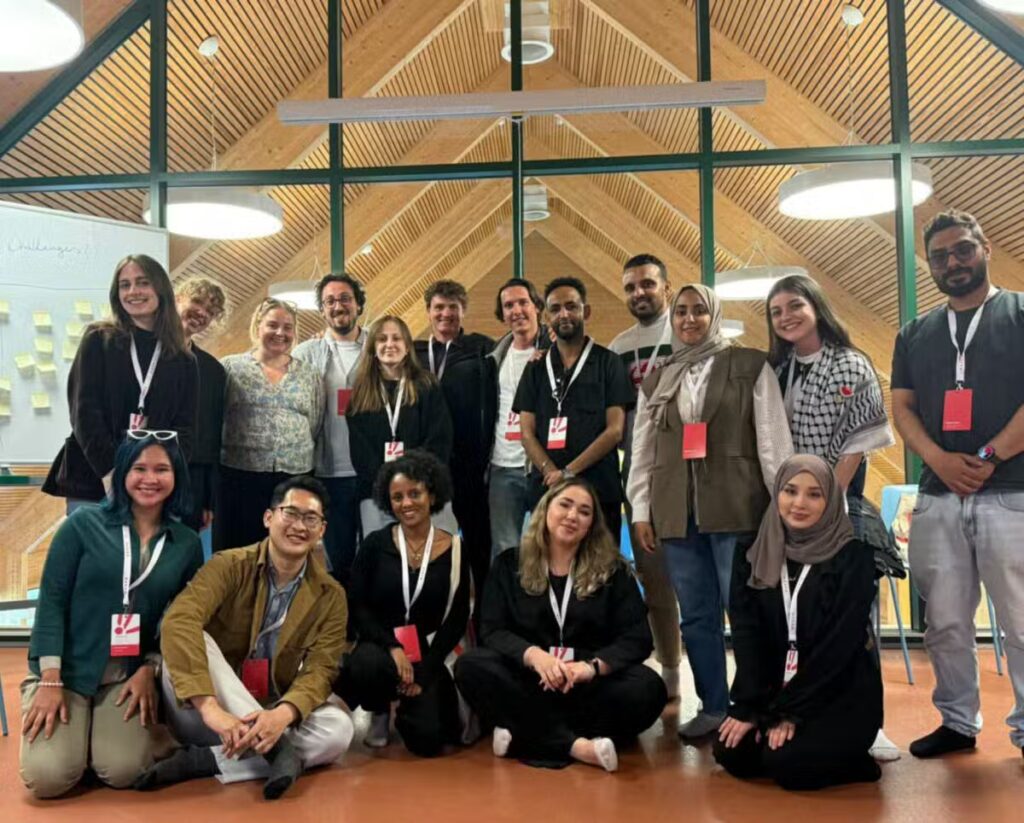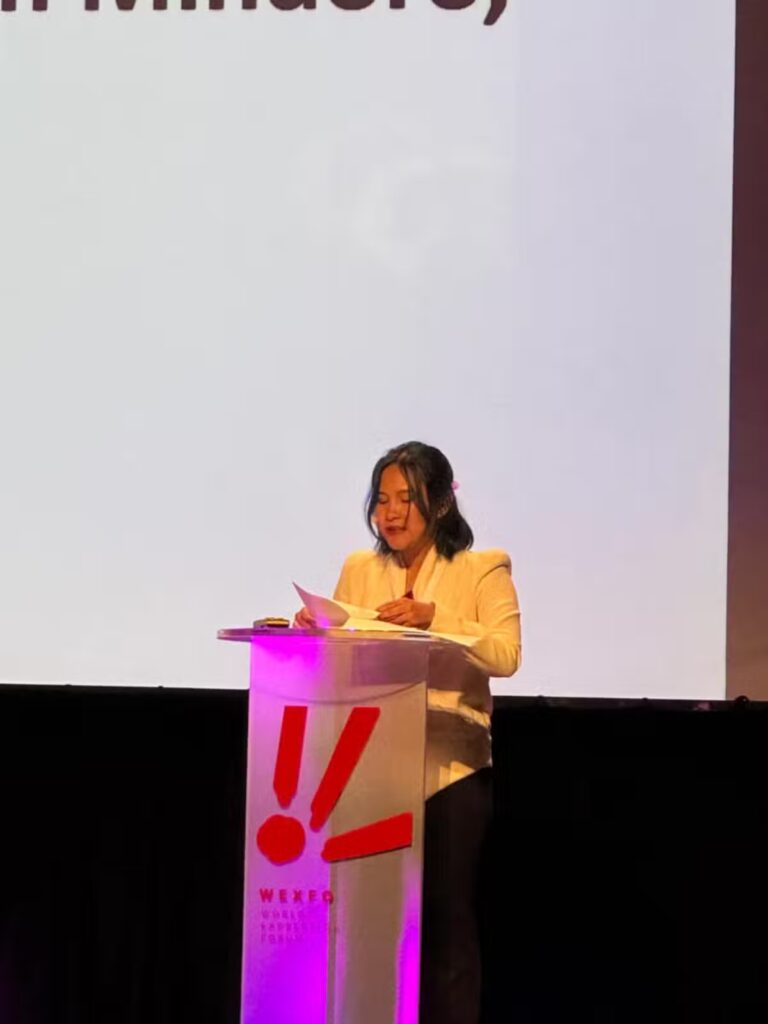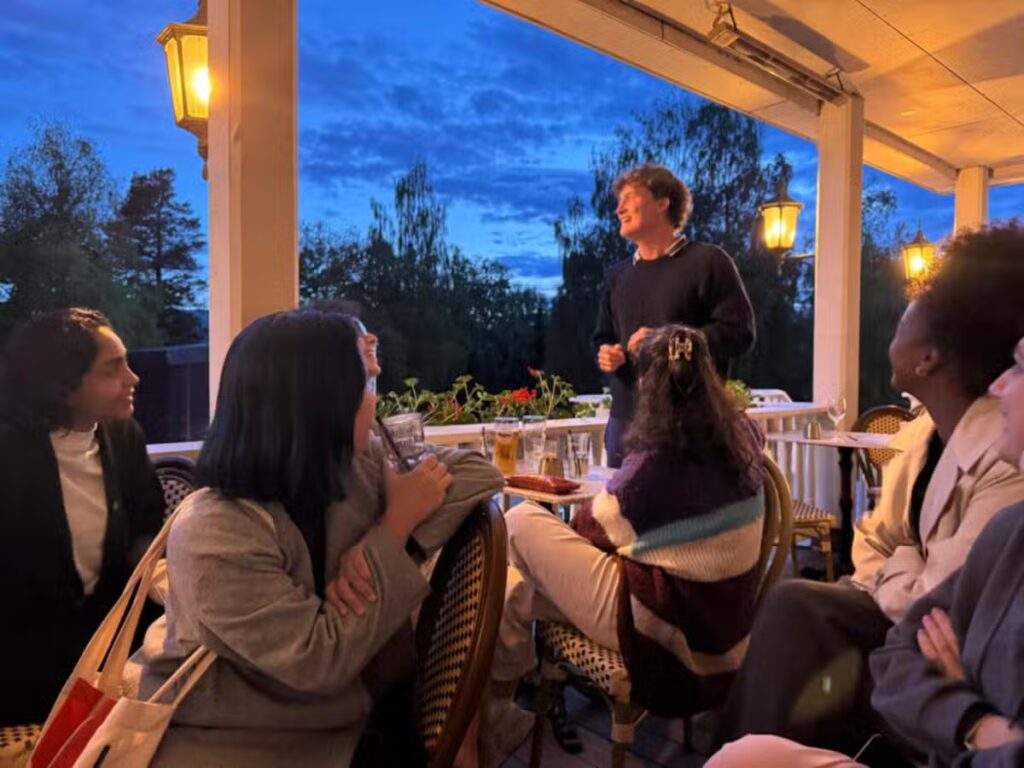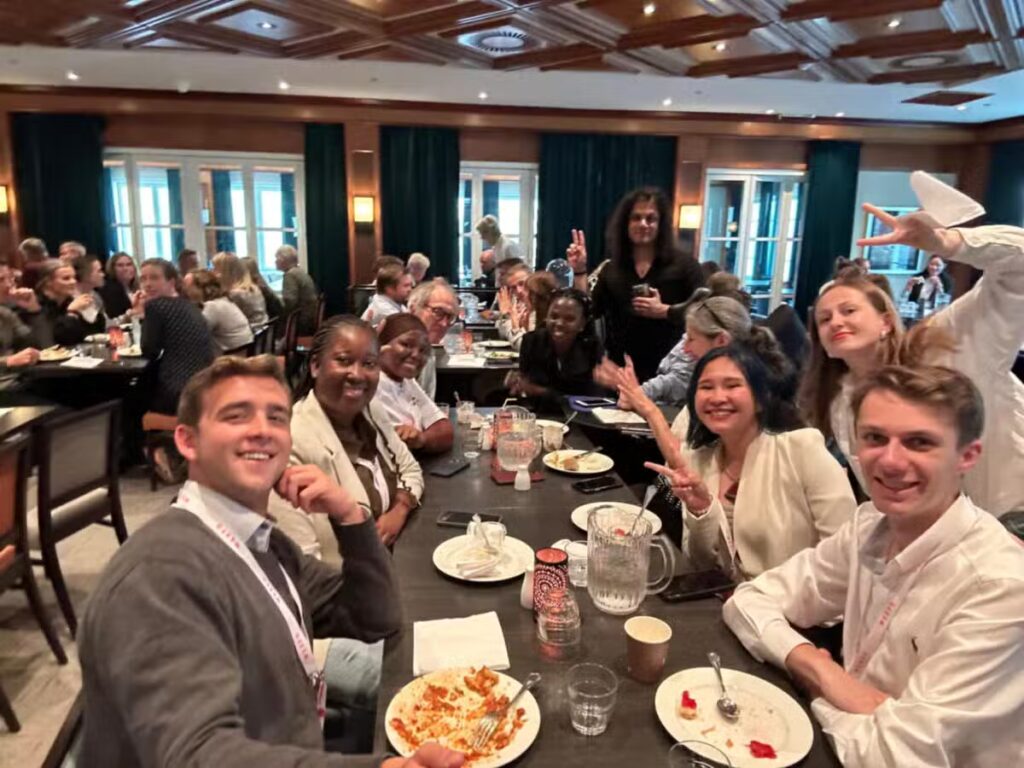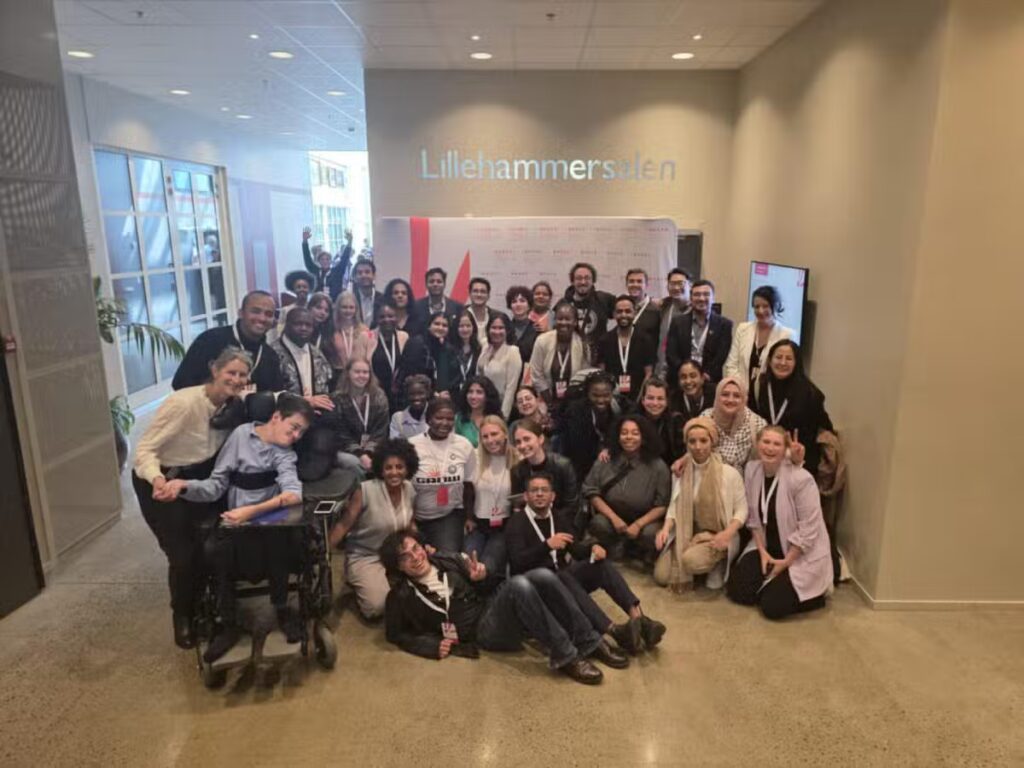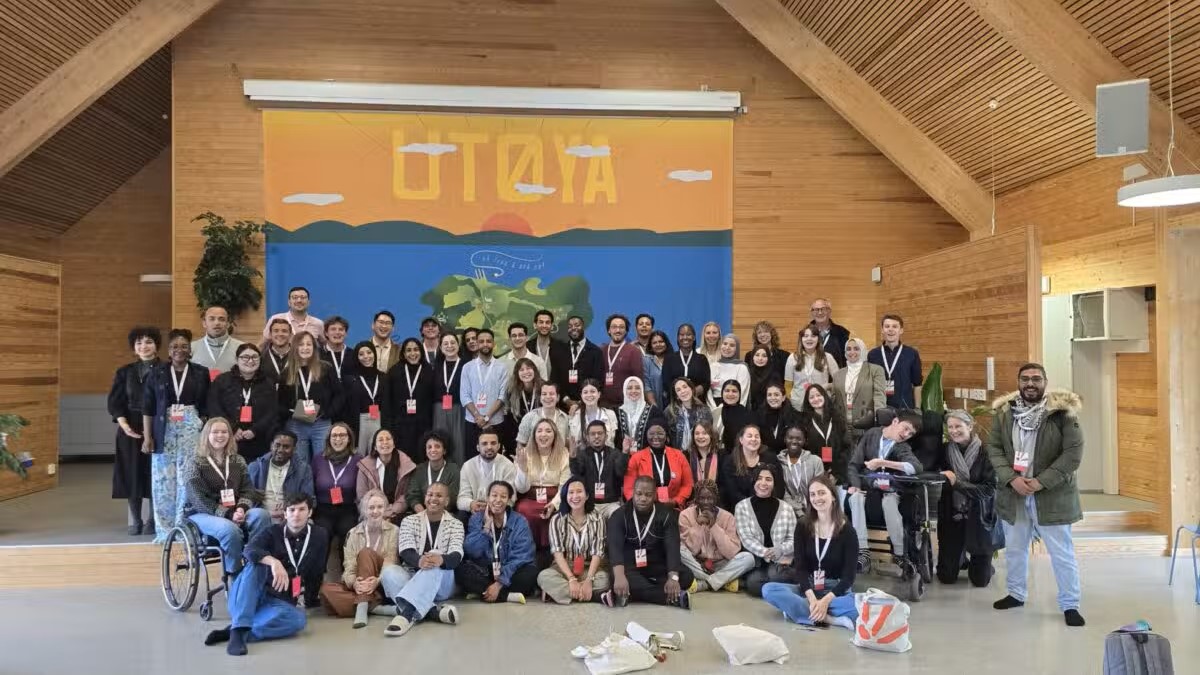
Text and photos by Karina Thyra Cordova – first published by inquirer.net (June 15, 2025). Karina is a writer and human rights advocate with a background in education, media, and social impact. Karina took part in the WEXFO Utøya Young Experts seminar 2025.
What do young people need? After six days of listening, sharing, grieving, and laughing at the World Expression Forum, I think I’m beginning to understand. I recently participated in the World Expression Forum (WEXFO) from May 30 – June 4, 2025, held in both Utøya and Lillehammer, thanks to a nomination from Awareness 360 — a youth-led NGO committed to empowering young people to support and uplift their communities.
From left to right: Paolo Cesarini, Programme Director of the European Digital Media Observatory (EDMO); Branko Brkic, founder of the project Kontinuum and Editor-in-Chief of Daily Maverick (South Africa); The Author, Richard Gingras, longtime Global Vice President for News at Google (CNTI), and American author and counter-disinformation specialist Nina Jankowicz; The session was moderated by Jakob Nielsen, Editor-in-Chief of Altinget, a Danish news outlet.
Being part of the conference was already an incredible experience, but I was also given the opportunity to speak on a panel titled “Did the Traditional Media Lose the Elections?” On top of that, I gave a speech on the final day. I initially felt unsure about it. Listening to the powerful, well-structured keynotes of other Young Experts, I wondered if mine sounded too raw or impassioned. But afterward, many encouraged me to keep it exactly as it was. It resonated. Sometimes, we don’t get another chance to speak truth to power. When that door opens, you walk through it.
Several Young Experts from around the world told me they agreed. Even in places like Canada, some news posts are blocked or invisible on platforms like Instagram. After the panel, one woman from publishing stopped me as I was leaving with friends and asked why I’d made those remarks about Western media, especially since such issues are being discussed in their parliaments. I told her I understood, but framing still matters. Most people don’t read full articles; they read headlines. And headlines shape public perception.
One of the more memorable moments of the panel came when I was asked, as the only Asian representative onstage, whether Asian journalism should follow the European or American model. I said neither. I emphasized that Asia—Southeast Asia in particular—still has strong journalistic institutions of its own. And I added, “The biggest prize a journalist can get in Asia is not a Pulitzer or a Nobel. It’s not to get killed.”
This line has been mentioned by people before me, and it bears repeating. As grim as that line is, it struck a chord. It reflects the risks journalists take in our region, where truth-telling can mean putting your life on the line. In many cases, we remain biased toward the truth, something much of mainstream Western media has lost. I brought up how some major outlets have failed to call what’s happening in Gaza a genocide, and how the language used shifts depending on who’s committing the violence. When powerful countries are involved, headlines become vague and diplomatic. But when it’s countries that are deemed undesirable—often in the Global South—the tone is clear and condemning.
That’s where my background in entertainment journalism comes in. Ironically, I’ve found more honesty there than in much of what now passes for mainstream reporting. We were taught not to mislead, not to sensationalize, not to bury the truth beneath clickbait. In contrast, much of today’s news spins narratives through tone, omission, and selective emphasis—especially when shielding certain interests. As Maria Ressa once said to me, in reference to that background: “That’s good—because right now, we’re being entertained in a bad way.”
In the end, the woman appreciated our exchange. It was respectful, and I acknowledged that her question was valid. But I also shared how, as someone immersed in digital spaces, I see daily how headlines distort or disguise, and how a few carefully chosen words can shape or smear entire narratives.
I left WEXFO humbled. People came up to say I’d raised important points, and I carry that with me. These conversations—sometimes difficult, always necessary—remind me that freedom of expression means little without honesty, accountability, and the courage to use it well.
Meeting the brave and the brilliant
At this conference, I met people who had lived through extraordinary, and at times horrific, experiences. Yet they never lost hope that things could get better.
Like the reclamation of Utøya after the right-wing terrorist attack, I met individuals forced to flee for doing something as simple as singing, performing, or speaking freely.
Some had survived bombings or lost loved ones under oppressive regimes or violent occupation, in places like Palestine, Lebanon, Syria, and Yemen.
There were people with disabilities who have made it their mission to uplift others. They’ve shown that while they might be differently abled, they are by no means lesser, despite what an exclusionary society might want them to believe.
Human rights defenders described working in legal systems where justice is far from guaranteed. Some quietly resist. Others grapple with funding cuts that leave countless lives in limbo — victims of policies that seem designed to tear families apart.
From Russia and Ukraine came people who stood in solidarity, knowing this war was never theirs. They carried deep losses but also a shared commitment to truth, memory, and one another.
Syrians told stories of imprisonment and torture, yet they kept the most beautiful, radiant smiles. Smiles that could light up a room and offer hope in otherwise hopeless places. Some, after years in exile, could finally return home and begin to rebuild.
Palestinians welcomed me like family, even after just half an hour of conversation. Some cannot return home because of the occupation. Yet in their stories, I found warmth, resilience, and a hope that refuses to be erased.
I also met people from across the African continent — journalists, advocates, and storytellers who brought deep insights into how they navigate democratic backsliding, censorship, and state repression. Even while being threatened for their uncompromising truths, they persist. Many practice solutions-oriented journalism: a powerful tool to not only expose injustice, but to offer critical, constructive responses. Through this, they challenge power without losing the public’s trust, and push for accountability without erasing hope.
These people, like Utøya itself, have reclaimed their lives — not to live in fear, but as living memory of what was lost and what is still possible. Each story reminded me: we are not alone.
Representation, building bridges, and the need for compassionate leadership
Now more than ever, I understand the profound value of representation.
I am one voice from the Global South, from a small town on a far-flung island in the Philippines. My experiences have been more privileged than many of my peers — I was sheltered, relatively untouched by direct state suppression. And yet, over the seven days we spent together, we found deep kinship. It was a bond not only rooted in shared trauma, but built on solidarity, mutual respect, and a profound understanding of what it means to live in a world where your voice is deliberately silenced.
The author giving a speech on the final day.
At times, both the Young Experts and Youth Voices felt unheard by some of the Old Experts. While their work laid important foundations, their engagement often resembled a lecture rather than a dialogue. Some struggled to shift from speaking to listening — an understandable challenge, but one that risks alienating the very people they claim to uplift. What might have been dismissed as youthful arrogance was, in truth, a call to be seen, heard, and supported: a request for mentorship, solidarity, and meaningful access to the tools and networks that create lasting impact.
This experience underscored a vital truth: we need to build bridges, not battlegrounds. Dialogue, not debate, must become our default. We must approach each other with openness, extend grace when miscommunication occurs, and stay humble enough to recognize when we are wrong or speaking from a place of privilege. Truth is shaped by perspective, and even so-called “shared reality” can look very different depending on where in the world we stand.
We must learn from one another with seriousness, method, and resolve just as authoritarians do. But in our pursuit of truth, justice, and reconciliation, we must never become monsters ourselves.
There is also a need for clarity and directness. We no longer have the luxury of verbosity that lacks substance. Those in positions of power have a real opportunity to go beyond traditional top-down approaches and truly listen to young people — especially those who can help shape policy. We’re not asking for indulgence, but for meaningful collaboration. Instead of waiting for their turn to speak, experienced voices might consider creating space for others to be heard. This isn’t youthful arrogance — it’s urgency, grounded in lived experience and a desire to help shape a better future.
When rebuilding fractured communities, especially those torn apart by disinformation, we must remember that the people we speak to are not enemies. They are human beings, shaped by the conditions around them. Many of the most underserved are not only economically vulnerable, but also the most heavily targeted by manipulative narratives. Changing minds in these contexts takes more than facts. It takes compassion, patience, and the courage to lead by example.
We must validate their concerns while offering tangible, accessible solutions. It’s not enough to dismiss harmful beliefs; we must understand where they come from and respond not with contempt, but with empathy. Calmness can speak louder than outrage. Humility can open doors that arrogance slams shut. If we truly want to create change, we must appeal to our shared humanity.
Behind our political divisions lies a deeper, more universal struggle: a class struggle, where the powerful protect their own interests while communities are left to fend for themselves. But even amid this imbalance, one transformed life is not insignificant. One changed mind can spark another. And so, when nurtured with intention, hope, inspiration, and love can ripple outward — faster and farther than fear, hate, or distrust.
Carrying hope into action
Hope is not always loud. Sometimes, it’s found in the quietest of moments — in the soft laughter shared over a late-night snack, or in the unexpected kinship built across balconies in the cold.
We gathered in between sessions and after long days, sometimes in random groups, sometimes with familiar faces, to decompress. We shared embarrassing stories, laughed over inside jokes, and listened intently as we took turns telling the truths that shaped us. Our days stretched nearly 20 hours: morning hikes after breakfast, intense dialogue during the forum, and long conversations deep into the night. Many of us also took full advantage of Norway’s fresh produce — a simple joy in itself.
There is also a need to make memories. That’s why I brought my camera and a selfie stick (that doubled as a tripod) to document the beauty of our time together, whether intentional or spontaneous. Because when all hope seems lost, we turn to memory: to those fleeting, precious moments that give us a glimmer of inspiration. Even the mundane becomes sacred in hindsight.
It was a joyful time, but also one of deep and sometimes painful reflection. Some of us numbed the heaviness with alcohol; others gathered to smoke and speak like the poets of old — young in age, but with eyes that carried the weight of many lifetimes. People whose realities have been shaped, or shattered, by forces far beyond their control. And yet, they persist.
As we say in Filipino, “habang may buhay, may pag-asa” — while there is life, there is hope.
Finally, there is no need for gatekeeping. Yes, I understand that the forum is positioned as high-level and exclusive — and it’s true that one must have meaningful experience in community work to be nominated or accepted. But the learning and solutions that emerge from such spaces must not be gatekept.
And they aren’t. Immediately after the conference, people were sharing platforms and ideas to build something — together. One standout is PEN International’s Tomorrow Club, which offers young people an avenue to express their perspective, especially those in countries where free speech is suppressed or where marginalized voices are denied a platform.
We need more of that. Tangible spaces. Real value. Initiatives that can get funded and activated — not just become pretty words floating on screens and reports. Something that can truly diversify, unify, and amplify young voices across borders.
Because the youth are no longer looking to the adults in the room to save us, or to declare: “you are the hope of our future.” That future feels as fragile and threatened as the climate crisis itself.
We are here. We exist. And we intend to keep living: to heal, to challenge, and to break the generational traumas that cynical older generations have left behind.
We’re going to be so loud, the world will have no choice but to listen. Not out of pity, but out of respect. Not someday — now.
It’s simple: include us yesterday, or risk irrelevance tomorrow. After all, the best predictor of the future is what we do today.
And so, I left Utøya and Lillehammer with a full heart and a life changed a thousand times over—shaped by the solidarity, fierce passion, hope, and unwavering determination I witnessed in our cohort. I’m deeply grateful to Awareness 360, the team at WEXFO, the municipality of Lillehammer, and to everyone around the world working tirelessly to protect our shared freedoms and contribute to a more inclusive, compassionate, and equitable world.
Some say faith in humanity can be restored. For me, it never left — it was just misplaced for a while.
The fight isn’t over. And we’re only getting started.

